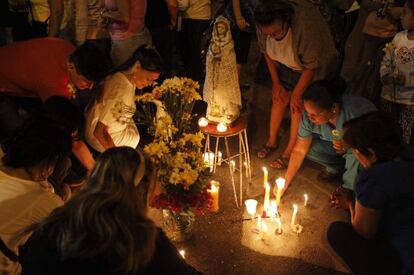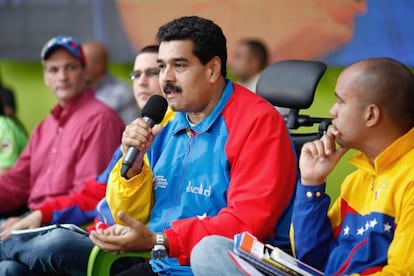Maduro promises “drastic measures” to quell Venezuelan unrest
Death toll rises to 25 after three more killings during anti-government demonstrations

As street battles in Caracas grew fierce and the death toll from the anti-government protests that have rocked the nation for more than a month rose to 24, an angry President Nicolás Maduro early Thursday vowed to crack down on those who are supporting and financing the unrest.
Following an emergency Cabinet meeting with top security officials, the embattled 51-year-old president, who has only been in office for 11 months, said he was going to take strong action to put an end to the violence that has spread throughout the country.
“I'm going to take drastic measures against these sectors that are attacking and killing people," a furious Maduro said in a speech to the nation.
In the latest waves of unrest, National Guard troops backed by armed government supporters clashed with rock-throwing students and other opposition groups late Wednesday after Maduro announced that he would not allow a planned demonstration in the capital to take place. The demonstrators converged in the southern neighborhood of Bello Monte in an attempt to organize a march to the Ombudsman’s Office in the center of the city.
Riot police blocked the streets as they tried to make their way toward the capital's historic quarter, prompting the demonstrators to cut through the sprawling Central University (UCV) campus to reach the other side. Nevertheless, police and National Guard troops were waiting for them.
At least 16 people were seriously injured when police fired tear gas to repel the protestors. Law enforcement also acted as a barrier to keep the opposition from clashing with pro-government demonstrators, who had called a counter-march the day before.
Since February 12, opposition groups and students have been holding a string of protests across Venezuela to protest food shortages and high crime, and to demand that Maduro call early elections.
Smaller groups of Maduro supporters converged at the city’s biggest roundabout, Plaza Venezuela, before marching toward Plaza Morelos in downtown Caracas where Maduro and his vice president Jorge Arreaza awaited them.

In front of hundreds of his supporters, the Venezuelan leader praised the police and National Guard for their “impeccable” action. “If we had let the fascist march pass, we would be counting the dead and all the destruction that would have taken place,” he said.
Nevertheless in central Carabobo state, a student, a middle-aged man and a National Guard officer were shot dead as unrest unfolded there. The state capital Valencia – some 200 kilometers from Caracas – saw the worst violence on Wednesday when armed government supporters battled opposition demonstrators.
Among the dead was Ranzor Bracho, a 36-year-old National Guard captain, and University of Carabobo student Jesús Acosta, who was reportedly shot in the head. Witnesses said that Acosta had not been taking part in the demonstrations.
Demonstrations were also held in other cities. Opposition leaders denounced that National Guard troops had raided the offices of the mayor of Barquisimeto, Alfredo Ramos, who is a Maduro critic.
In Maracaibo, the country’s second-largest city, soldiers and pro-government supporters shot at apartment buildings in one area.
Meanwhile, the Union of South American Nations (Unasur) announced that it would send a mission to Venezuela in an effort to foment peace between the government and opposition.
Tu suscripción se está usando en otro dispositivo
¿Quieres añadir otro usuario a tu suscripción?
Si continúas leyendo en este dispositivo, no se podrá leer en el otro.
FlechaTu suscripción se está usando en otro dispositivo y solo puedes acceder a EL PAÍS desde un dispositivo a la vez.
Si quieres compartir tu cuenta, cambia tu suscripción a la modalidad Premium, así podrás añadir otro usuario. Cada uno accederá con su propia cuenta de email, lo que os permitirá personalizar vuestra experiencia en EL PAÍS.
En el caso de no saber quién está usando tu cuenta, te recomendamos cambiar tu contraseña aquí.
Si decides continuar compartiendo tu cuenta, este mensaje se mostrará en tu dispositivo y en el de la otra persona que está usando tu cuenta de forma indefinida, afectando a tu experiencia de lectura. Puedes consultar aquí los términos y condiciones de la suscripción digital.








































